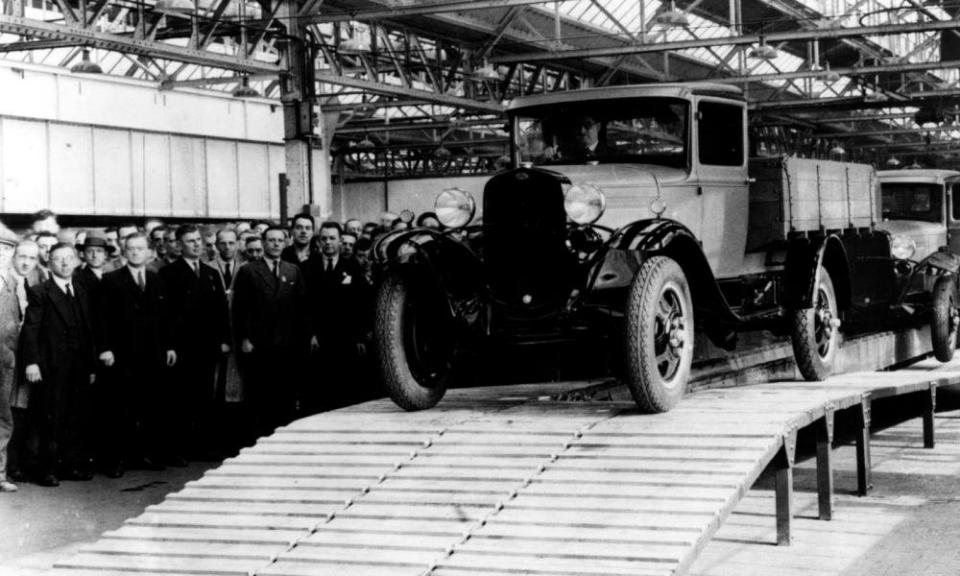Britain’s tired old economy isn’t strong enough for Brexit

Brexit, at its heart, is a recognition that Britain has become steadily weaker since it spent much of its empire wealth fighting two world wars – too feeble in the years before the 2016 referendum to sustain an exchange rate of $1.60 and €1.40, just as it was too poor to cope with $4 to the pound in the 1950s and $2 to the pound in 1992.
Manufacturers were unable to make things cheaply, reliably or efficiently enough against the headwind of a high-value currency, forcing many to give up. An economy that boasted 20% of its income coming from manufacturing in the 1980s found it was the source of barely 10% at the beginning of this decade.
Surges in GDP growth in the 70 years since the war can be attributed (and this short list makes the point crudely) to periods when there were cheap raw materials and energy costs; or a growing population; or foreign ownership and management of key industries; or the offloading of vast amounts of state and mutually owned assets; or cheap borrowing. Without these in operation to improve the UK’s performance, a lower exchange rate became inevitable.
Some Brexit campaigners made a cheaper currency their explicit aim, arguing that while Britain’s wealth and standing in the world would be diminished in the short term, the breathing space given to manufacturers would allow them to sell abroad at cheaper prices, then use the funds to invest and gain the efficiencies needed to cope with a return to a higher exchange rate sometime in the next decade.
Brexit is only something – even if you accept the premise of socialism or free-market bonanza – that works on paper
There is a good deal of logic to the argument, but it rests, like so many revolutionary aims, on the many and competing forces in the economy doing exactly what its proponents want them to.
For instance, manufacturers, with a few honourable exceptions, have refused to invest more than the bare minimum for decades, even when the exchange rate has helped them. There are windfall profits to be made when currencies fall: but these windfalls have been trousered by shareholders, not invested.
Banks, too, are a roadblock to growth and principally need to wean themselves off the property drug. This is why the shadow chancellor, John McDonnell, argues strongly for regional banks to bypass the existing high street lenders.
Again, this appears like a new-world solution to an age-old problem. What could be more farsighted and lead to more diversity than supporting a new breed of financial lender with a remit to find successful entrepreneurs?
But the risks are huge – not just of lending to people with dud business plans, but also of creating an institution that is stuck in the mire of British hope-for-the-best management from the moment it is launched. Without a revolution in the way companies and public sector institutions are managed, there is little hope of a self-induced revival. That is why the car industry is now foreign owned and run.
Brexit is also said to be the answer to Britain getting a pay rise. With fewer immigrants, the argument goes, the labour market will tighten and before too long workers will find themselves in the happy position of bidding up their wages.
Not so fast. When so much growth over the past six years of recovery has been in the low-paid services sector, it is more likely that those businesses, confronted by angry staff, will close rather than pay up. They provide a discretionary service with a price ceiling: charge more and the customer will choose to do something else. That goes for hotels and coffee bars. They could all suffer hugely.
So whether the solution to a more balanced and faster-growing economy is providing existing institutions with an incentive (a lower pound to exporters) or bypassing institutions, such as today’s commercial banks, there is little guarantee the GDP dial will move. Power to the workers from lower immigration doesn’t make a difference if all it means is that the jobs they are doing disappear.
Brexit is only something – even if you accept the premise of socialism in one country or free-market bonanza – that works on paper. Which is a distinct problem when so much of what the UK has relied on for growth is running dry.
There are not many state assets left to flog. Raw materials and energy costs are rising, while the foreign ownership and management of key industries could decline as Brexit cuts off easy access to the world’s largest free-trade bloc.
This week, GDP figures for the fourth quarter of 2017 will show the economy trundling along in the run-up to Christmas. If modest growth is all that is required, it can be achieved as long as borrowing remains cheap. Without cheap borrowing, predictions of the economy’s decline will become real.

 Yahoo Finance
Yahoo Finance 